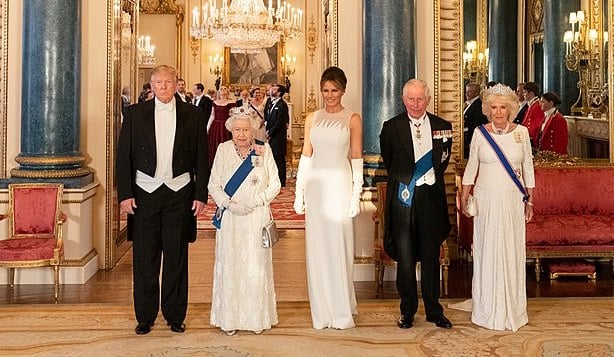“Soft Power” is real power. The State Banquet at Buckingham Palace earlier this month showed royals and the President at their best, with an unstated but perfectly clear implication: no other country can do this. It were well to keep on good terms with the people who can put on a show like this. Everyone was at the top of their form: Trump behaved impeccably, and the First Lady was supremely elegant. The president’s family and retainers were paired with the inexhaustible supply of royals, and they will remember the day for the rest of their lives. The Queen, the spine of the US/UK relationship, goes back to Herbert Hoover in retirement, and she has met all subsequent presidents. Many will recall Ronald Reagan riding with the Queen in Windsor Great Park. She always gets on well with visiting presidents and seals a relationship much to the advantage of both nations. The dinner wine list included bottles of sparkling wine from Windsor Great Park (excellent, these days; climate change has been good for English wine-growers), and the main course featured a saddle of Windsor lamb. The final toast was with Chateau Lafite-Rothschild ’90.
If you regard the Palace Banquet as a Masque of State, an updating of a courtly entertainment devised by Inigo Jones and Ben Jonson four centuries ago, then you see an anti–masque too. That is a comic or grotesque performance as a dance before or during the main acts. With startling fidelity to their historical traditions, the anti-Trump protesters played their part in the great occasion. They were kept well in hand by the authorities, whose vigilance on all matters of security was reinforced by their US counterparts. The protesters were ably supported by the media, much of it devoted to anti-Trump propaganda of a kind we are used to. Simon Schama, the historian, was allowed on BBC TV to go on a prolonged rant against Trump, which at first settled on “fascist” as the main-line term of abuse. (Note the small “f”: the word is “Fascist-lite,” perhaps because the fearless opponents of Trump do not wish to incur court proceedings based on the real thing.) He then moved on to “Bonapartist,” an altogether classier variant of the charge. Wellington always called Napoleon “Buonapart,”reckoning that the name did the great man no favors. One has heard this line before: in the 1970s America was flooded with people convinced that Nixon was out to overthrow the Constitution. This presidential visit is proceeding along hallowed lines, with an extremely well-staged main plot and the revolutionary mob permitted to make uncouth noises off-stage. All play their parts in a notable success, a triumph of statecraft.

Leave a Reply